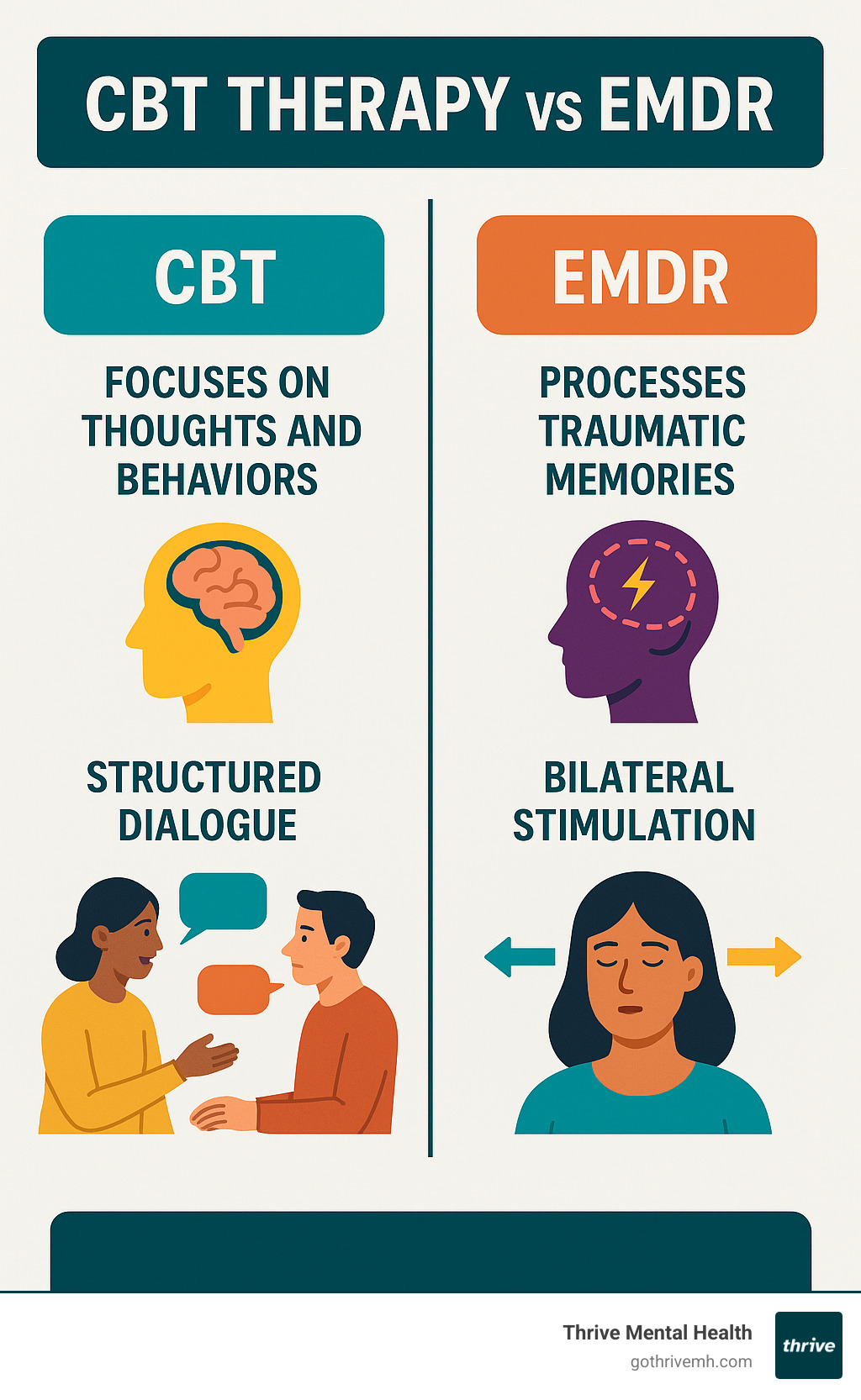Exploring memory processing techniques in emdr therapy for mental health
Comprehending EMDR Treatment: Exploring Its Advantages and Advantages for Psychological Wellness
EMDR treatment has become a noteworthy strategy in the domain of psychological health and wellness, especially for those facing trauma. Its structured technique of processing distressing memories establishes it apart from standard treatments. The potential renovations it uses for various emotional obstacles warrant closer assessment. As people look for efficient solutions for their mental health, recognizing the subtleties of EMDR might provide important understandings into its applications and benefits. What exists beneath its therapeutic pledge?
What Is EMDR Treatment?
Eye Activity Desensitization and Reprocessing (EMDR) treatment is an organized strategy designed to minimize the distress connected with traumatic memories. Developed by Francine Shapiro in the late 1980s, EMDR integrates elements of cognitive-behavioral therapy with bilateral stimulation, usually with assisted eye activities - licensed emdr therapists nyc. The treatment intends to assist individuals process and reframe terrible experiences, decreasing their psychological fee and effect on everyday life
During EMDR sessions, clients recall distressing memories while at the same time taking part in particular bilateral stimulation strategies. This twin focus is thought to assist in the brain's natural recovery procedures, enabling the integration of disrupted memories. EMDR is frequently employed to deal with problems like post-traumatic anxiety condition (PTSD), anxiety, and clinical depression. Its organized nature and versatile framework make EMDR accessible to a varied series of clients, providing hope and remedy for the problems of unsettled injury.
The Scientific research Behind EMDR
Understanding the systems underlying EMDR therapy discloses an interesting interaction between neurological reactions and psychological procedures. Research suggests that EMDR activates the mind's information processing system, promoting the combination of traumatic memories. This process shows up to engage the reciprocal excitement typically made use of in EMDR, which can assist re-shape neural pathways linked with distressing experiences.
Studies have actually revealed adjustments in mind activity patterns throughout EMDR sessions, specifically in locations connected to emotional law, such as the amygdala and prefrontal cortex. These changes suggest that EMDR might reduce the psychological cost of terrible memories, consequently permitting individuals to process their experiences a lot more adaptively.
In addition, neuroimaging studies highlight alterations in the default mode network, which may play a duty in just how individuals connect to their memories. Overall, the scientific exploration of EMDR highlights its possible efficiency in advertising psychological health via an intricate interaction of cognitive and neurological systems.
Exactly How EMDR Works: The Process Explained
While numerous restorative techniques concentrate on spoken handling, EMDR utilizes a distinct method that integrates bilateral excitement to facilitate recovery. The procedure begins with the therapist helping the customer recognize traumatic memories or ideas. As soon as these targets are established, the specialist guides the customer via a series of eye activities or various other forms of bilateral excitement, such as touching or auditory cues. This stimulation is believed to help in processing the memories, allowing the mind to recycle distressing experiences a lot more adaptively.
Throughout the sessions, customers might experience a variety of emotions and insights as they challenge their memories. The specialist maintains an encouraging setting, guaranteeing the client really feels risk-free throughout the process. After the stimulation, the therapist aids the client assess any kind of modifications in their feelings or ideas concerning the targeted memories. This structured technique intends to minimize the emotional charge linked with trauma, advertising a healthier psychological state.
Benefits of EMDR for Injury Healing
EMDR therapy supplies considerable advantages for individuals recouping from trauma. It helps with an accelerated recovery procedure, assisting customers process distressing memories more efficiently. Additionally, it decreases psychological distress and enhances coping abilities, empowering individuals to handle their experiences much more properly.
Accelerated Healing Process
As people look for effective methods for getting rid of injury, the accelerated healing procedure supplied by EMDR therapy stands apart as a transformative strategy. Unlike traditional restorative methods that might take years to yield results, EMDR helps with rapid processing of distressing memories. This approach allows clients to confront and integrate uncomfortable experiences in an organized fashion, often resulting in developments within a couple of sessions. The reciprocal excitement inherent in EMDR assists to desensitize individuals to upsetting memories, promoting a sense of security and control. As a result, customers regularly report significant reductions in trauma-related symptoms. By speeding up the healing journey, EMDR encourages people to redeem their lives and move on with restored durability and hope, making it a useful choice for trauma recuperation.
Lowered Psychological Distress
Emotional alleviation comes to be obtainable through the application of EMDR therapy in injury healing. This therapeutic technique assists in the processing of terrible memories, which frequently add to frustrating emotional distress. By utilizing bilateral excitement, EMDR allows clients to gain access to and reframe distressing experiences, lowering their psychological fee. As individuals involve with their memories in a safe setting, they may experience a significant reduction in stress and anxiety, concern, and anxiety connected with previous traumas. Furthermore, EMDR promotes a sense of safety and empowerment, allowing individuals to face their feelings without becoming overloaded. Because of this, clients typically report an improved mood, cultivating resilience and an extra well balanced point of view on their lives. This reduction in emotional distress is a vital advantage of EMDR treatment.
Improved Coping Skills
While trauma can leave people really feeling vulnerable, EMDR therapy furnishes them with improved coping abilities that facilitate resilience and personal growth. By resolving the origin of distress, EMDR assists clients determine and create reliable strategies to manage their emotional responses. These coping abilities consist of mindfulness, basing strategies, and psychological regulation, which empower people to browse challenging scenarios with higher simplicity. As clients progress with EMDR treatment, they learn to reprocess terrible memories, transforming their perceptions and decreasing feelings of anxiety and vulnerability. This newfound capacity to deal not only aids in trauma recuperation yet likewise boosts overall mental wellness, resulting in improved relationships and a much more satisfying life. Ultimately, EMDR fosters a feeling of company that supports lasting psychological health.
EMDR and Its Effectiveness for Anxiety and Clinical depression
EMDR therapy operates on the concept of bilateral stimulation, which may aid individuals process and reframe distressing memories connected to stress and anxiety and depression. Study shows encouraging medical success prices, suggesting that EMDR can be an effective treatment for these psychological health problems. Understanding the hidden mechanisms and end results of EMDR offers understanding into its healing potential.
Device of EMDR
Various studies have shown the effectiveness of Eye Activity Desensitization and Reprocessing (EMDR) therapy in treating anxiousness and depression. The mechanism of EMDR includes reciprocal stimulation, usually via directed eye activities, which facilitates the processing of traumatic memories. This dual focus allows individuals to recycle stressful experiences while maintaining an emphasis on the existing, reducing emotional disruption. EMDR intends to incorporate fragmented memories, diminishing their unfavorable psychological influence. Via organized stages, the therapy helps clients reframe their understandings, promoting flexible ideas regarding themselves. This procedure not just alleviates symptoms of stress and anxiety and anxiety yet additionally improves emotional guideline, causing boosted psychological health. On the whole, EMDR's one-of-a-kind method offers an extensive framework for recovery mental distress.

Clinical Success Prices
Research shows that EMDR therapy has actually shown amazing success rates in easing signs of stress and anxiety and depression. Different studies have shown that individuals going through EMDR frequently experience substantial reductions in stressful symptoms within a fairly brief period. important source A meta-analysis disclosed that EMDR is as effective as standard cognitive-behavioral treatment for treating both stress and anxiety and anxiety. Additionally, some patients report enhancements after just a couple of sessions. EMDR's performance is attributed to its distinct technique, which aids recycle traumatic memories, resulting in lowered emotional distress. Clients often reveal high contentment with their therapy end results, keeping in mind boosted emotional law and general wellness. This proof sustains EMDR's expanding acknowledgment as a beneficial therapeutic choice for mental health and wellness professionals.
Discovering an EMDR Specialist: What to Think about
When Continued browsing for an EMDR therapist, what vital aspects should one consider to assure a good fit? Initially, it is necessary to verify the specialist's qualifications and qualifications, ensuring they are trained especially in EMDR therapy. This training ought to be backed by acknowledged certifications from credible organizations
Next, think about the specialist's experience, specifically with instances similar to one's own. Different specialists might have differing areas of focus and experience, which can significantly influence the therapeutic process.
One more vital facet is the specialist's approach and style. A good connection and comfort level between the client and therapist are crucial for reliable treatment.
In addition, sensible factors to consider such as schedule, session, and area expenses ought to not be neglected. By thoroughly assessing these elements, individuals can make informed selections in their search of EMDR treatment, improving their chances for successful psychological health outcomes.
Often Asked Concerns
Can EMDR Treatment Be Utilized for Children and Adolescents?
Yes, EMDR therapy can be effectively made use of for adolescents and youngsters. Research study indicates that it assists in processing traumatic experiences, aiding more youthful people establish coping methods and enhance psychological guideline in a supportive setting.
The length of time Does an EMDR Therapy Session Typically Last?
An EMDR treatment session generally lasts in between 60 to 90 minutes. The period may differ based on private requirements and therapeutic objectives, ensuring that each session successfully addresses the customer's specific experiences and difficulties.
Is EMDR Therapy Covered by Insurance Coverage Plans?
EMDR therapy coverage differs by insurance strategy. Some plans include it as component of psychological health benefits, while others might require particular standards to be met. Individuals must consult their insurance policy supplier for thorough information.
Exist Any Kind Of Side Effects of EMDR Therapy?

The Number Of Sessions of EMDR Treatment Are Normally Needed?
Commonly, individuals might need anywhere from six to twelve sessions of EMDR treatment, depending on the intricacy of their trauma and individual development (emdr therapy new york city). Some may require additional sessions for much deeper issues or continuous assistance
Eye Movement Desensitization and Reprocessing (EMDR) treatment is a structured approach developed to reduce the distress linked with terrible memories. Psychological alleviation ends up being obtainable through the application of EMDR therapy in injury recuperation. As clients advance via EMDR therapy, they discover to recycle traumatic memories, transforming their assumptions and lowering feelings of stress and go to my blog anxiety and vulnerability. EMDR therapy operates on the principle of reciprocal excitement, which might help clients procedure and reframe traumatic memories linked to stress and anxiety and clinical depression. EMDR treatment may lead to short-term side impacts such as raised psychological distress, vivid memories, or physical discomfort during sessions.